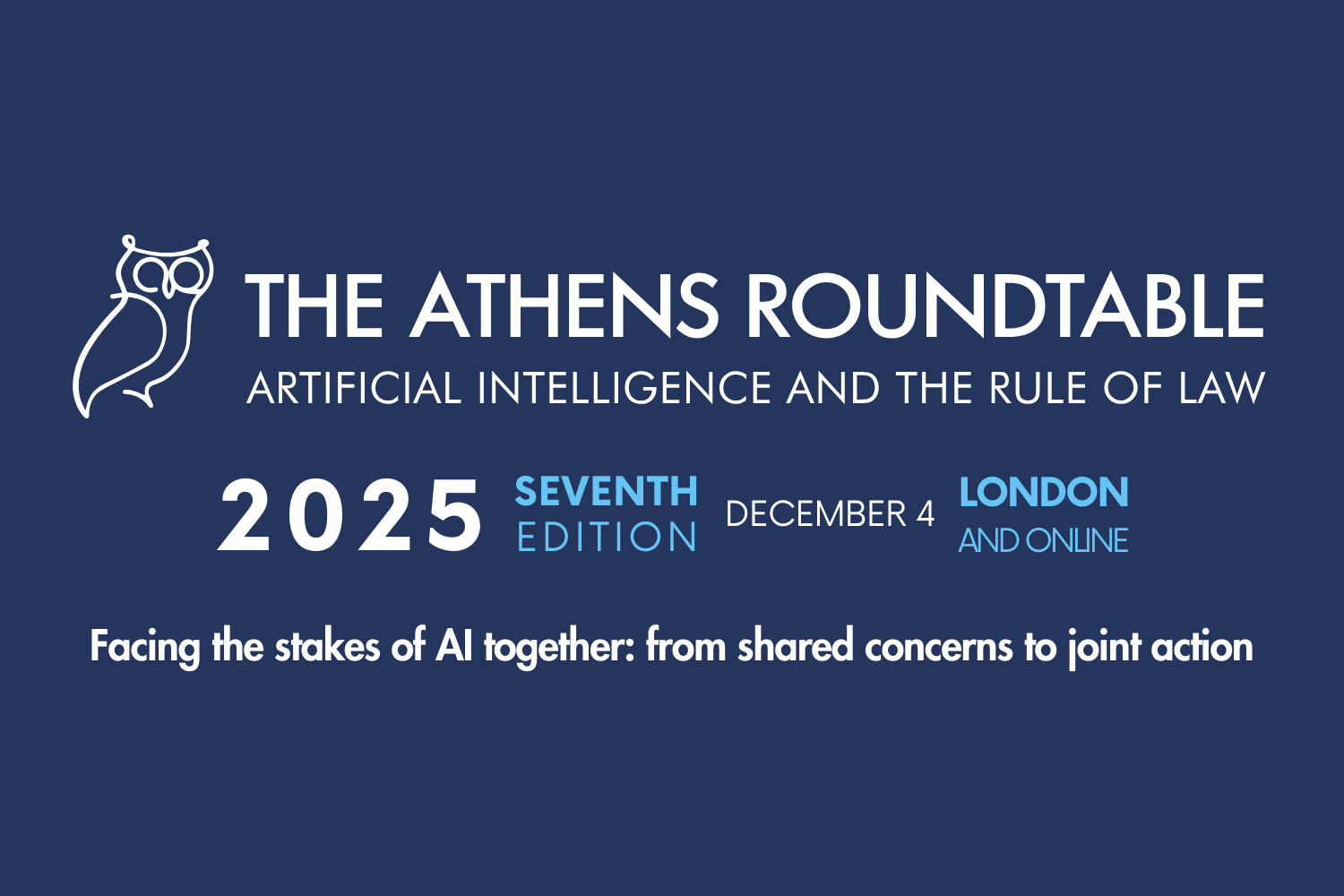Facing the stakes of AI together: The Seventh Edition of the Athens Roundtable on AI and the Rule of Law

2025 has shown the world what is at stake with the rise of artificial intelligence. OECD monitoring shows that AI-related incidents and hazards are becoming more frequent and complex, with numerous examples involving synthetic media, child safety, cyberattacks, and the misuse of powerful AI tools. And this is still just the beginning.
Actors across the spectrum of organisations working on AI governance must agree on the foundational concept of checks and balances to govern the growing capabilities of AI. We may have different views on how to pursue AI governance, just as we focus on different types of AI risks. Yet this urgent moment calls for us to come together and work together before critical policy windows close.
The Athens Roundtable on AI and the Rule of Law was created as a platform for international dialogue and collective action. At the heart of our annual event is a recurring commitment to fostering candid dialogue and collaboration across government, industry, civil society, and academia. That is why we bring together individuals from around the world who don’t always have the opportunity to speak with each other. The discussions that take place inside and outside the conference room are catalytic for policymaking, as participants connect with new people, ideas, and possibilities.
RELATED >> AI governance through global red lines can help prevent unacceptable risks
On December 4, the Athens Roundtable will return for a seventh edition. It will be held in person at the Royal United Services Institute in London and livestreamed for our global audience. This year, our theme is “facing the stakes of AI together: from shared concerns to joint action.” This edition will flag what policymakers and other decision-makers need to keep on their radar for 2026 and beyond, helping them find common ground at a time when global cooperation is under strain.
We will do this by directly confronting vital questions together: How do we define and prevent unacceptable AI risks such as those that could lead to societal harm and destabilisation? What institutional safeguards do we need to detect and respond to AI incidents? How can we bridge geopolitical and sectoral divides to build lasting, inclusive frameworks for AI accountability? How do we protect our children and younger generations in the age of AI?
This year’s edition will be structured around two central goals:
- Stress-testing the current status of global AI governance. The plenary sessions will set the stage by examining the current and anticipated technical capabilities of frontier AI systems and their implications for governance, exploring how emerging AI policies across jurisdictions align or diverge, and situating all of this in today’s geopolitical context. As AI systems evolve and the global landscape shifts, many existing AI governance efforts, from voluntary principles to regulatory frameworks, now face real tests of relevance and durability. We’ll take a critical look at what is working, what is not, and what might be needed next.
- Exploring new avenues for international coordination. At a time when trust in institutions is eroding and multilateralism is under strain, we will foster candid dialogue to identify areas where cooperation is in everyone’s interest. Through dedicated closed-door dialogue sessions, we’ll discuss concrete ways to work together on two urgent priorities: unacceptable AI risks and serious incident prevention and preparedness.
Our agenda will cover some of today’s most pressing topics for AI governance, with sessions that focus on:
- Frontier AI capabilities & implications for policymakers
- Children in the era of frontier AI: A governance imperative
- Policy landscape: AI governance across jurisdictions
- The role of voluntary guidelines and commitments
- Contextualising AI in our geopolitical moment
- AI red lines: Identifying and governing unacceptable AI risks
- Collective security: International coordination to prevent major crises
Speakers will provide insights on technical governance, the current policy landscape, and the contextualisation of AI in this geopolitical moment, with the aim of driving the practical, coordinated, and multilateral progress our world needs. We will be hearing from leaders with a range of expertise, including:
- Vilas Dhar, Patrick J. McGovern Foundation
- Sofia Zacharaki, Greek Minister of Education
- Lord Tim Clement-Jones, UK House of Lords
- Elham Tabassi, The Brookings Institution
- Liam Booth-Smith, Anthropic
- Margaret Satterthwaite, UN Special Rapporteur on the independence of judges and lawyers
- Neema Lugangira, African Parliamentary Network on Internet Governance
- Robert Trager, Oxford Martin AI Governance Initiative
- Rebecca Finlay, CEO of Partnership on AI
- Kenneth Cukier, Deputy Executive Editor, The Economist
Despite our diverse views on how to govern AI, we all come to the Roundtable because we believe that better AI governance is needed, urgent, and feasible. This is the moment to act collectively with clarity and imagination, and that’s the spirit that will drive this edition. What happens now will shape our future with AI, and together we can steer it in a positive direction.
Organised by The Future Society, the seventh edition of The Athens Roundtable is being hosted in partnership with the OECD and UNESCO. Held under the auspices of H.E. the President of the Hellenic Republic Mr. Constantine An. Tassoulas, it is an official Pre-Summit Event of the AI Impact Summit 2026 that will take place in India.
Sign up for the interactive livestream here.


































